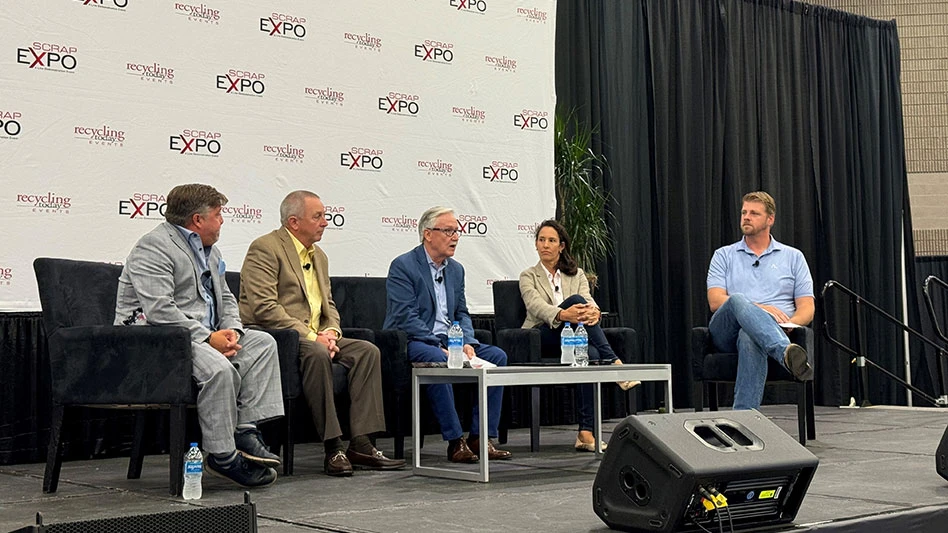
Photo by DeAnne Toto
A session at Scrap Expo, Sept. 17-18 in Louisville, Kentucky, explored the recent investments in recycled-content aluminum production and their effects on scrap packages and demand.
“Decarbonization is everything in the market now,” moderator Greg Wittbecker, president of Florida-based Wittsend Commodity Advisors, said. He added that the decarbonization trend is here to stay and will only get more attention from the ultimate consumers in the market.
However, Wittbecker said, a “conundrum” has arisen in the scrap business concerning the carbon content of obsolete versus prime scrap and whether obsolete scrap truly can be considered to have less carbon. “It’s as if someone waved a magic wand over it.” Yet, it’s clearly the material that the new projects are targeting, leaving Wittbecker wondering where all the desired postconsumer scrap is going to come from.
Sorting investments
He mentioned that further sorting zorba, the shredded mixed aluminum grade, is the “holy grail” that could help to meet this demand. While the technology that has been developed works, it’s not that fast, Wittbecker said. “Ten tons per hour is not going to keep pace with the appetite of these mills. We need to see a quantum leap in speed, or they will need to be stacked up on one another.”
Matt Meyer, nonferrous commercial manager at the David J. Joseph Co., Cincinnati, speaking about sorting technology, said, “A lot of people are chasing that mouse trap.”
Atlanta-based Novelis is one such company.
Novelis is building a $2.5 billion recycling and rolling plant in Bay Minette, Alabama, that it broke ground on in 2022. The facility, the first fully integrated aluminum mill built in the U.S. in 40 years, is expected to add 600,000 tons of finished aluminum goods capacity annually.
Beatriz Landa, vice president, metal procurement and recycling, Novelis North America, Atlanta, said two-thirds of the 600,000 tons of coil produced at the site will be for the can market, with the remainder going to automotive, construction and some niche markets. “We will be selling commercial coil by the end of 2026,” she said, noting that the site’s volume largely is contracted. “Now, it’s a matter of executing.”
She said a deficit exists between scrap supply and demand, which the company is trying to address through technology and partnerships.
Novelis has invested in and partnered with Markle, Indiana-based Sortera Technologies, which has developed artificial intelligence, image/data analytics and advanced sensors for sorting scrap metal. Novelis says it will use Sortera's advanced sorting technologies to recycle more automotive postproduction and postconsumer scrap.
The company is sorting mixed clips with Sortera, Landa said, and the technology is performing well segregating 5000-series aluminum from 6000-series.
“We are pretty much there with the cast,” she added, acknowledging that economic viability remains an issue.
Power in partnerships
Partnerships also factor into how St. Louis-based Shapiro Metals extends its reach, Tim Ridderbos, general manager of Circular by Shapiro, said.
The company has 10 locations in Missouri, Alabama, Texas, Tennessee and Georgia that serves industrial accounts that primarily generate nonferrous scrap. “We are trying to move in the direction of being a circular supplier,” Ridderbos said.
Owl’s Head Alloys, Bowling Green, Kentucky, recently partnered with Aluminum Dynamics LLC, Columbus, Mississippi, having been awarded a long-term agreement to provide services to the Steel Dynamics Inc. (SDI) aluminum rolling mill.
Owl’s Head provides tolling services, melting aluminum products and byproducts into sow, ingot or molten form.
Mike Boyle, president of Owl’s Head, said 65 percent of the company’s business serves the rolling and extrusion sector and 35 percent serves the casting industry. Its new site under construction in West Point, Mississippi, will support Aluminum Dynamics by providing 450 million pounds of processed metal per year.
In Mississippi, Owl’s Head primarily will process the scrap Aluminum Dynamics can’t handle and its dross, Boyle said, with the plant expected to start up in late November or early December.
The scrap landscape
Meyer estimated that 40 percent of the scrap available today is new production material while 60 percent is obsolete material.
Regarding the used beverage can (UBC) scrap that Novelis consumes, Landa said roughly 40 percent originates from deposit states, 40 percent comes from scrap yards and 20 percent comes from material recovery facilities (MRFs).
Despite the work the Can Manufacturers Institute has been doing to promote deposit legislation in an effort to improve the UBC recycling rate, Landa said it has been a tough sell, with new legislation unlikely any time soon.
Landa said to be a preferred supplier to Novelis, scrap companies need to ensure that their paperwork matches what has been loaded on the truck and what has been purchased. In an effort to be friendlier to its scrap suppliers, she said Novelis now looks at loads monthly rather than load by load.
Meyer said 5000-series and 6000-series clips cannot be combined and sold today as mixed low-copper clips (MLC), with Wittbecker adding that automotive companies don’t understand why the spread between MLC and segs is widening, saying they “cannot do the math.”
Meyer predicted that bankruptcy could be coming for some aluminum mills that are not as advanced as competition for scrap intensifies.
When Wittbecker raised the possibility of whether the U.S. government could ban scrap exports, “We’re concerned,” Landa said. “We need to be careful that we protect scrap, or we will see the bankruptcy of some companies in the future.”
Meyer said, “As long as the government doesn’t force zorba to stay in U.S., there is plenty of opportunity to buy scrap.”
Latest from Recycling Today
- AF&PA report shows decrease in packaging paper shipments
- GreenMantra names new CEO
- Agilyx says Styrenyx technology reduces carbon footprint in styrene production
- SABIC’s Trucircle PE used for greenhouse roofing
- Hydro to add wire rod casthouse in Norway
- Hindalco to invest in copper, aluminum business in India
- Recycled steel price crosses $500 per ton threshold
- Smithers report looks at PCR plastic’s near-term prospects





